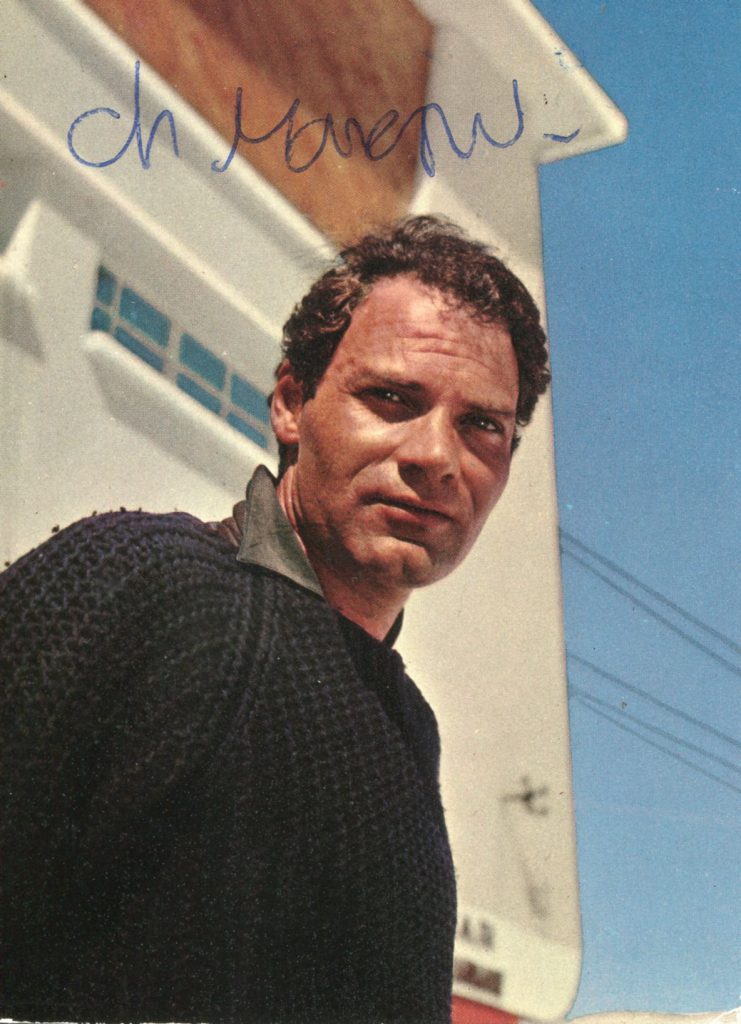
Ronald Bergan’s “Guardian” obituary from 2000:
But the film also gave Marquand’s career a boost. Vadim’s debut movie tells of how Bardot, shortly after her marriage to a wimpish Jean-Louis Trintignant, finds she is more attractive to her dour but handsome brother-in-law, Marquand. Coincidentally in real life, Trintignant was to marry Marquand’s sister, Nadine, a few years later. But back on the beach, Bardot teases Marquand into ripping off her clothes and taking her.
The film created a scandal in France. This was mainly because of the discreet nudity of the beach scene, but Vadim complained that the censors forced him to cut the sequence.
Marquand himself was no stranger to scandal. The previous year he had a role in Marc Allègret’s Lady Chatterly’s Lover, which had starred Danielle Darrieux as the erring English aristocrat. In his private life, he married Tina, the daughter of Jean-Pierre Aumont and Maria Montez, in 1963, then had a son by the actress Dominique Sanda in the early 1970s. Thus he seemed to reflect his adulterous film persona.
One of his best pictures was Alexandre Astruc’s Une Vie (1958), based on a Guy de Maupassant story. In it, Marquand was the womanising husband of a young, innocent aristocrat, played by a cloying Maria Schell.
His affair with a friend’s wife (beautiful Antonella Lualdi) leads to his death. The main strength of the film, apart from Claude Renoir’s wonderful impressionistic Technicolor photography, was the way in which Marquand managed to find many nuances in the unsympathetic character he played.
Marquand was born in Marseilles, the son of a Spanish father and an Arab mother; the fact that he spoke Spanish, Arabic, French, English and Italian – all learned as a child – aided his international career. At the age of 21, his dark good looks got him a bit part in Jean Cocteau’s Beauty And The Beast (1946), and he was soon getting slightly bigger roles, such as the Bohemian officer friend of the caddish soldier hero (Farley Granger) in Luchino Visconti’s lush melodrama, Senso (1954).
In the 1960s, he moved with ease between films made in France and those coming out of Hollywood. Among the uninspiring latter were the D-Day epic, The Longest Day (1962), in which Marquand enlisted as part of the French contingent; Fred Zinnemann’s post-Spanish civil war film, Behold A Pale Horse (1964), in which he played a Spaniard; and, as the French doctor among the aircrash survivors, in Robert Aldrich’s The Flight Of The Phoenix (1966).
Marquand was better served by Claude Chabrol in The Road To Corinth (1967), in which he portrayed an American Nato security officer investigating mysterious boxes jamming US radar installations in Greece. In 1962, he made Of Flesh and Blood, a competent thriller featuring Anouk Aimée, and the first of two films he directed.
Marquand’s succès de scandale was Candy (1968), about the conquests of a nymphet, played by Ewa Aulin, and adapted by Buck Henry and Terry Southern from the latter’s novel. In the movie, a large international cast, including Marlon Brando, Richard Burton, John Huston, Walter Mathau, James Coburn, Charles Aznavour, Elsa Martinelli, Ringo Starr, and even the boxer Sugar Ray Robinson, did a series of star turns.
The result, according to the Monthly Film Bulletin, was that “hippy psychedelics are laid on with the self-destroying effect of an overdose of garlic”. Disappointed by this mainly negative reception, amidst the era of the love generation, Marquand returned to acting.
Tragically, in the early 1980s, however, he was struck by Alzeimer’s disease and retired from the world. He spent many of his last years in hospital, not knowing anybody who visited him. His sister, the director Nadine Trintignant, wrote a moving book about his plight, Ton Chapeau au Vestiaire (His Hat in The Cloakroom).
She survives him, as do his actor brother Serge Marquand, his former wife Tina Aumont, and his son.
Christian Marquand, actor; born March 15 1927; died November 22 2000


Comment
Kate
That’s a great photo